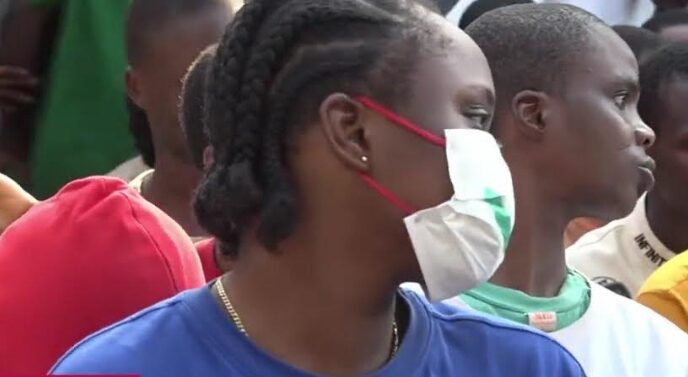The Lagos State Government has reiterated its commitment to transforming the state’s waste management system from a linear “collect and dump” approach to a more sustainable circular economy.
EpeInsights reports that the Commissioner for the Environment and Water Resources, Mr. Tokunbo Wahab, stated this during the 2025 Ministerial Press Briefing held at the Bagaulda Kaltho Press Centre, Alausa, Ikeja.
Wahab said Lagos generates over 13,000 metric tonnes of solid waste daily, and to address this challenge, the state has signed several Memoranda of Understanding (MoUs) aimed at enhancing waste-to-resource opportunities.
These agreements cover improvements in waste collection, recycling of both solid and liquid waste, and the establishment of a smelting plant for converting electronic waste, which will position Lagos as a leader in e-waste recycling.
He announced the state’s partnership with Dutch firm Harvest Waste Consortium for the development of a high-efficiency 60 to 80 megawatts Waste-to-Energy plant at the Epe landfill.
The plant will use advanced technology to convert approximately 2,500 tonnes of municipal, commercial, and industrial waste into clean energy daily.
Another MoU with Lafarge Africa/Geocycle focuses on treating non-recyclable combustible waste and diverting it from landfills for industrial energy use.
According to Wahab, these initiatives are part of broader efforts to transform Lagos into a megacity with sustainable waste processing systems, modernized landfill management, cleaner waterways, and structured sanitation infrastructure.
He emphasized the state’s decisive move towards a circular economy by banning the use of Styrofoam food packs and single-use plastics, which are major contributors to flooding and blocked drains.
Since enforcement began in 2025, 351 cubic metres of Styrofoam, equivalent to 123.95 metric tonnes, have been confiscated.
To maintain cleanliness across the state, Wahab said that 15,000 street sweepers are deployed daily to cover highways, inner roads, and markets.
He added that the government has intensified enforcement of environmental laws, penalizing violators and working closely with paramilitary agencies to uphold the 2017 Lagos State Environmental Protection and Management Law.
Nearly 700 people were arrested for unsafe highway crossing, while 6,789 individuals were apprehended for failing to use pedestrian bridges.
Additionally, 192 environmental abatement notices were served, and 150 people were arrested for open defecation on pedestrian bridges.
He disclosed that 3,786 street traders, environmental offenders, and cart pushers were arrested and prosecuted. Clean-up operations were carried out in areas such as Ikeja, Oshodi-Oke, Iyana Iba, Apongbon, Lekki, Victoria Island, Agege, Obalende, and the Lagos-Badagry Expressway.
Wahab also linked the decline in flash flood incidents to the government’s partnerships and sustained efforts in waste management and drainage clearing.
He revealed that over 300 kilometres of secondary collector drains and 70 kilometres of primary channels were awarded for construction, with many already completed or ongoing.
Between 2023 and 2025, a cumulative total of 666,740.5 kilometres of secondary collectors across 397 locations were maintained and cleaned.
Additionally, the government restored 12 primary channels and 84 secondary collectors, covering a total length of 128.5 kilometres.
The Emergency Flood Abatement Gang (EFAG) cleaned 181 drainage collectors covering 242,846.5 metres in 2024 and has cleaned another 72 collectors totalling 166,846.5 metres so far in 2025.
Eighteen drainage channels passing through schools across Agege, Alimosho, Surulere, Epe, Ikorodu, Badagry, and Ajeromi-Ifelodun were deflooded in 2024, with seven more completed this year.
Contracts have also been awarded to tackle flooding on Lagos Island, including areas like Oroyinyin, Idumagbo, Binuyo, Aroloya, Epe, and Ojo-Giwa.
To counter the tidal effect of flooding, Wahab said the state has constructed a state-of-the-art pumping station at Ilubirin, the first of its kind in Africa.
The station is designed to discharge stormwater from Lagos Island into the Lagoon via an elevated channel, supporting the ongoing regeneration project.
He added that the ministry maintains year-round monitoring of river gauging stations in locations such as Majidun-Awori, Falomo, and Kara Bridge. Automatic weather stations are also maintained at Agidingbi Grammar School, Government Senior Model College in Ikorodu, and Waziri Ibrahim College on Victoria Island to improve real-time flood prediction and alert systems.
Highlighting Lagos’ commitment to climate resilience, Wahab said the government is investing in urban greening programs, enhancing air quality, and expanding the city’s air quality monitoring infrastructure.
The Lagos State Parks and Gardens Agency recently launched the “Trees for Lagos” campaign, targeting the planting of an additional 50,000 trees within two years to support environmental sustainability.
In water infrastructure, the Commissioner revealed that the state has revived the 70 million gallons per day (MGD) Adiyan II project, which is set to be completed by 2027 and will provide safe drinking water to over five million residents.
The 2MGD Mosan Okunola facility has also been recommissioned, ending a 25-year water supply shortage in the Baruwa-Abesan community. Additionally, the rehabilitation of the Isashi Waterworks was completed in 2024.
Wahab concluded that the present administration remains focused on building a cleaner, greener, and more climate-resilient Lagos through innovative environmental policies and strategic infrastructure development.













